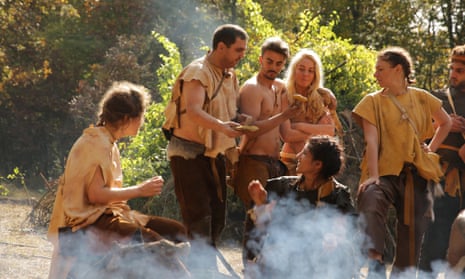“I believe I was born 10,000 years too late,” said lorry driver Paul. Personally I’ve never harboured a desire to return to an earlier, simpler time before reading, writing and refrigeration, but to each his own.
Paul is one of the participants recreating a pre-agricultural version of The Good Life in the new reality series 10,000 BC (Channel 5). Twenty 21st-century refugees were dropped into a clearing in a Bulgarian hunting reserve – “a wild environment similar to prehistoric Britain” – last October, with the aim of spending eight weeks hunting, gathering and getting on. You can tell from the opening credits that it didn’t go well.
10,000 BC owes a debt to Bear Gryll’s The Island, although that was all men and this is half women. This show also begins with an admirable upfrontness about the little compromises that mean the experience is not quite as prehistoric as all that. Archaeologist and ex-Navy Seal Klint Janulis (I think he got that from a “What’s Your Archaeologist and ex-Navy Seal Name?” quiz on Facebook) has provided his charges with period shelters, a few rudimentary tools, animal skin outfits, and also boots and socks. And a supply of clean drinking water, a bit of fruit and some salt. And 24-hour supervision by a medical team. It’s health and safety gone Mesolithic.
“Left to their own devices,” said Janulis, “people could die.” He’s not wrong. Among the volunteers with archery skills and poaching experience, there were a few less well-qualified applicants. Josie the betting shop manager is strictly vegetarian and very anti-hunting (she’s gonna love the stone age). Another participant turned up in high heels. There are also a number of would-be survivalists whose principal attributes appear to be a knack for getting on everyone’s nerves; I’m sure their time to shine will come. “This is also a social experiment,” said Janulis, and yes, of course it is, in the same sense that a warehouse fire is a chemistry experiment.
The first order of business – before the complete breakdown of social order – was the skinning of the complimentary dead deer provided by Klint. A skinning committee was formed to hack at the carcass with some pieces of flint. At first they seemed confused about which end to start with – “I’ve got to take the bum out, and tie a knot in it,” said fencing contractor Paul – but the operation then proceeded with calm efficiency. Likewise the production of fire was deliberate and methodical.
That’s not to say the stone-agers weren’t having problems. They forgot to sort out their stuff before it got dark, and then couldn’t find anything. They were plagued by mosquitoes during the day, their deer meat was rotting fast and maggots had infested their animal skins. They had to be provided with some post-Mesolithic blankets.
They were dropping like flies from the first. Caroline – at 65 the oldest of the group – keeled over after two hours and was carted away. She never even got a chance to put her cozzie on. Landscape gardener Perry left on Day 2. And advisor Klint Janulis has now abandoned them to their fate, and the 24-hour medical team stationed in the bushes. All hell should break loose on schedule tomorrow, when episode two airs. It probably won’t have you hankering for the stone age, but it might make you wish you lived in a time before television.
Storyville: The Internet’s Own Boy (BBC4) told the gripping if thoroughly disheartening tale of internet visionary Aaron Swartz’s prosecution for the unauthorised downloading of academic papers. Swartz killed himself in early 2013, age 26, while awaiting a trial in which US federal prosecutors were seeking a 35-year custodial sentence and fines up to $1m. Swartz had already spent vast sums on his defence, rejecting every plea bargain offered him.
The journalist and digital rights activist Cory Doctorow first came across Aaron Swartz on a mailing list for colleagues at work on the fledging RSS format. He asked him why he never appeared at the face-to-face meetings. “I don’t think my mom would let me,” was Swartz’s reply. He was 14.
As a prodigy Swartz helped develop RSS, Creative Commons licensing and Reddit. Politically active as well as technically brilliant, he was devoted to open information access, and it was with that in mind that he hacked into MIT’s servers to download millions of pages of academic papers from the JSTOR document library. JSTOR eventually dropped their charges against him, but federal prosecutors wanted to make an example of Swartz.
Friends and colleagues put the case that we’ve lost a true visionary in the service of misplaced prosecutorial zeal. The wealth of footage of Swartz himself – clever, thoughtful, committed, beguiling – made it all the more heartbreaking.

Comments (…)
Sign in or create your Guardian account to join the discussion